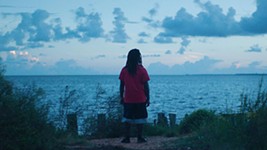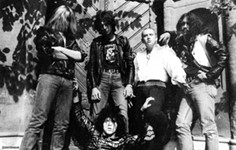Imperfect Game
The Texas Documentary Tour: 'Small Ball' follows a Little League team and its parents to the World Series
By Anne S. Lewis, Fri., Oct. 8, 2004

Looking back over the 25 years of films produced by New York filmmakers Louis Alvarez and Andy Kolker, you've gotta admit that it has been a charmed (and charming) run on the documentary circuit. They call what they do "anthropology," and I suppose that's an accurate, if a wee too clinical, way to describe the quirky, hilarious (both funny ha-ha and funny peculiar), frequently award-winning, always spot-on looks they've taken at assorted slivers of Americana: from the human political circus (Vote for Me: Politics in America and Louisiana Boys: Raised on Politics) to women's sexuality (Sex: female) and motherhood (MOMS), to social class (People Like Us) and regional dialects (American Tongues).
In Small Ball (2004), Kolker and Alvarez turn their lens on Little League, that once innocent and above-reproach extracurricular that has recently unspooled a bit to reveal a more complicated convergence of the ambitions of kids, parents, and coaches. What they discovered, Alvarez explains via e-mail, is that "there are all sorts of coaches – some scream, some plead; it's a really tough job motivating kids but keeping in mind that they are, in fact, KIDS. But, if you asked coaches about the biggest challenge of their jobs, I'd bet most would say 'THE PARENTS,' who are either not supportive, too supportive, or too intrusive." (And, he adds, "The old-time coaches lament the over-structuring of kids' lives these days, too, but that's a whole other film.")
To make Small Ball, the filmmakers started out by casting a big net, following a number of teams and, in a bit of deus ex machina (or just the luck o' the experienced doc-makers), one of those teams, from Aptos, Calif., just south of Santa Cruz, turned out to be one of eight to make it to the Little League World Series in Williamsport, Pa. They quickly zoomed in exclusively on the Aptos team, following it for two months, as it progressed from local to state to regional to, finally, taking its place around the diamond at the nationals. (Not surprisingly, the biggest challenge, recalls Kolker, "was not knowing if the team would win or lose! We could never plan ahead more than a day.") In the end, with two colorful "California-cool" coaches – a semiconductor salesman and retired major league pitcher, Mark Eichhorn – 12 kids with the right stuff and a slate of parents representing Every Parent, the Aptos All-Stars turned out to be one terrific story.
And one that leaves us viewers sitting excitedly on the edge of our bleacher seats, cheering for Aptos – but always, always with an eye peeled for some parent or coach to slip up and Do the Questionable Thing.
Austin Chronicle: Okay, so how did Little League capture your attention?
Louis Alvarez and Andrew Kolker: Well, truth be told, Little League was not exactly on our scope as a topic for exploration. It was brought to us by the good people at Penn State Public Broadcasting – they're right down the road from Little League headquarters in Williamsport, Pa. They had approached the Corp. for Public Broadcasting with the idea of doing a history of Little League but they thought it should do something more contemporary and suggested that they contact us.
Now I (Andy) had played Little League when I was 12; Louis had not. Given the higher profile that Little League had gotten recently with so many games being broadcast on ESPN, a scandal or two, and the general professionalization of youth sports, we thought that there might genuinely be something there for us to explore. As you know, we're interested in themes that illuminate the "human comedy" and hold up a mirror to American society, so we thought LL might just be the ticket (so to speak).
Films are always hard to make, but this one had a lot of fun attached to it. One producer (Andy) and the editor (Peter Odabashian) knew a lot about baseball; one producer (Louis) knew very little, and the cameraman (John Chater) – who was great – didn't know a thing: After every game he would talk about how great the "match" had been. Oh, and our transcribers were Korean exchange students. You should see how they would describe a strikeout on paper.
AC: And what were the odds that with over 6,400 Little League teams with big aspirations, you'd just happen to be following one "with legs," so to speak?
LA and AK: We initially conceived of Small Ball as an essay about Little League – something more akin to some of our other films, which use lots of different material woven together to create a broad picture. So, we began filming with this in mind: profiling disparate coaches, leagues, families from around the country and indeed, the globe (for example, we followed a Ukrainian-American who started a Little League in the land of his ancestors). We also began following two All-Star teams – one in upstate New York, one in northern California – with the expectation that maybe one of them would have a modest success in the intense competition to get to the LL World Series. The chances of getting there – only 8 teams out of some 6,400 in the U.S. succeed – are obviously infinitesimal. Our team in N.Y. went down to predicted defeat; but our other team, a bunch of kids from the tiny coastal town of Aptos, near Santa Cruz, were not to be denied. So, much to the incredulity of their parents and coaches (and to us as well), the boys from Aptos went all the way to Williamsport and to 12-year-old glory. And ultimately, that is what Small Ball became: one story about the remarkable ride that the kids, parents, and coaches made to Pennsylvania. The moral for us as filmmakers is that you can't keep a good story down; the pull of a good narrative tale outweighs an essay any day. We may also have exhausted our filmmakers' karma for at least a decade. And as much as we would have liked to have included some very good material that we had gathered from around the country, nothing could compete with Aptos. The good news is that now that we have DVDs, there's some place for all the other material.
AC: So, the team that you wanted the film to be about fell into your lap, but what about the supporting cast of characters?
LA and AK: Aptos is a largely middle- to upper-middle-class community: The schools are good, the weather is nice, there's a sense of community, and the people we met were by and large happy to be there. It's not the type of place that one would first think about profiling in a documentary. Which made it a bit of a challenge – the parents were nice and seemed genuinely aware of the pitfalls of putting too much pressure on their kids to achieve. On the other hand, they also knew that winning more games meant more success and a chance at a lifetime experience for their kids, as well as themselves. So this consciousness was both a potential blessing and curse, and we became fascinated by how they navigated those treacherous waters. And the appeal of the film to many viewers, other than being a good sports yarn, is putting yourself in the shoes of those parents and coaches and imagining how you might fare in a similar situation. We end our film with a famous Yogi Berra quote: "Little League Baseball is great because it keeps the parents off the streets." That about says it all.
AC: Did you ever sense that the Aptos folks were playing to the camera or sugarcoating their lives?
LA and AK: Well, they were certainly media-savvy, but other than the natural inclination to try and put on your best face for the camera, we're pretty sure that after six weeks of filming, we pretty much captured who they were. The manager, Dave Anderson, told us that after the first few days of filming, he started to feel weird if we weren't there. Some critics and viewers appear to have wanted a more hard-hitting (to coin a phrase) portrait of LL and its flaws. We certainly didn't shy away from this. But in a documentary story like this, one largely plays the cards one is dealt, and there were precious few situations where anyone could be seen to be misbehaving in anything but a common, human way.
AC: How's your working partnership holding up? Any changes in how you two go about making your films, or is the magic formula still golden?
LA and AK: Well, other than being a bit older and at least potentially wiser (i.e., not taking on gargantuan projects that are hideously underfunded – there are such things as mortgages and kids to consider), we're pretty much holding things together.
You know, making documentaries has always been a big crapshoot – I think we're both amazed we're still doing it pretty much in the same manner as when we started 25 years ago. You learn to roll with the punches. We worked for four years on People Like Us and premiered it in New York on September 10, 2001 – the day before 9/11. You can imagine what happened to our PR campaign. But still, people sought it out on TV, and it's a huge success in the educational market and will probably remain so for years to come. At least until someone else is crazy enough to make a film on American social class. And that's probably what matters in the end – as long as there are people watching our films, we won't complain too much. ![]()
Small Ball screens as part of the Texas Documentary Tour on Wednesday, Oct. 13, 7pm, at the Alamo Drafthouse Downtown (409 Colorado). Louis Alvarez and Andrew Kolker will conduct a Q&A after the screening. Tickets are $4 for current Austin Film Society members and new members joining before the screening, as well as students, and $6 for nonmembers. They are available only through the Austin Film Society at www.austinfilm.org or at the venue one hour prior to screening.










